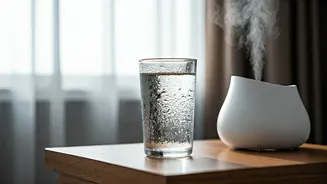Indoor Air Dryness
Dry air, particularly prevalent in the winter months due to heating systems, can significantly impact throat moisture. Central heating and air conditioning
units often remove moisture from the air, creating a dry environment. When the air lacks humidity, it can draw moisture from your throat and nasal passages, leading to dryness and discomfort. This is often exacerbated when sleeping with your mouth open, as air flows directly over your throat. Regular use of a humidifier, especially in the bedroom, is a simple yet effective countermeasure. Consider monitoring the humidity levels in your home and adjusting them to a comfortable range. Drinking plenty of water and staying hydrated can also help in these situations. Additionally, using a saline nasal spray before bed can help moisten your nasal passages, reducing the likelihood of mouth breathing and throat dryness.
Mouth Breathing At Night
Breathing through your mouth while you sleep is a major contributor to morning throat dryness. Unlike nasal breathing, which filters and humidifies the air, mouth breathing allows air to directly pass over your throat, stripping away moisture. This can be caused by various factors, including nasal congestion due to allergies or colds, structural issues such as a deviated septum, or even the position you sleep in. If you suspect mouth breathing is the issue, it's crucial to address the underlying cause. Strategies to consider include using nasal strips to open nasal passages, elevating your head with an extra pillow to improve nasal airflow, or consulting a doctor if you suspect a more serious issue. Avoiding alcohol and sedatives before bed is also important, as they can relax throat muscles and make mouth breathing more likely.
Allergies and Post-Nasal Drip
Allergies, often triggered by dust mites, pollen, or pet dander, can cause congestion and post-nasal drip. This excess mucus draining down the throat can irritate and dry it out, especially at night when you're lying down. Antihistamines and decongestants can help manage allergy symptoms and reduce post-nasal drip. However, it's also important to identify and avoid allergy triggers. Regularly cleaning your bedroom, using an air purifier, and keeping windows closed during high pollen seasons can all help. If you experience persistent symptoms, consult an allergist for personalized guidance. They can help you identify specific allergies and recommend appropriate treatments. Consider using a saline nasal rinse to clear nasal passages and reduce post-nasal drip before bedtime.
Acid Reflux Impacts
Gastroesophageal reflux disease (GERD), or acid reflux, can cause stomach acid to back up into the esophagus and even the throat during the night. This acid irritates the throat lining, leading to dryness, soreness, and a burning sensation. Symptoms are often worse when lying down. Dietary changes can play a crucial role in managing acid reflux. Avoid eating large meals or consuming trigger foods like spicy or fatty foods close to bedtime. Elevating the head of your bed can also help prevent acid from traveling up into your throat. Antacids and other medications can help neutralize or reduce stomach acid production. If symptoms persist or worsen, consulting with a healthcare professional is crucial for proper diagnosis and treatment. They might suggest additional tests or medications to manage your condition.
Medication Side Effects
Certain medications can have side effects that contribute to throat dryness. Antihistamines, used to treat allergies, can dry out mucous membranes throughout the body. Decongestants, though they can clear nasal passages, may also have a drying effect. Some antidepressants and other medications may also cause dryness as a side effect. If you suspect that a medication is causing your dry throat, consult your doctor. They may be able to adjust the dosage, switch to an alternative medication, or recommend strategies to manage the side effects. It's important never to stop or change your medication regimen without consulting your healthcare provider. In some cases, drinking more water or using a humidifier may help alleviate dryness related to medications.
Sleep Apnea & Snoring
Untreated sleep apnea, a condition where breathing repeatedly stops and starts during sleep, can also lead to throat dryness. Snoring and mouth breathing are often associated with sleep apnea. The constant effort of gasping for air can dry out the throat. Similarly, the vibration from snoring can irritate and dry the throat tissues. If you suspect you have sleep apnea, seeking a diagnosis from a doctor is essential. They may recommend a sleep study to monitor your breathing patterns. Treatments for sleep apnea can include lifestyle changes, such as weight loss, or the use of a CPAP machine (continuous positive airway pressure), which helps keep airways open during sleep. Proper treatment can improve sleep quality and reduce symptoms like throat dryness and snoring.















